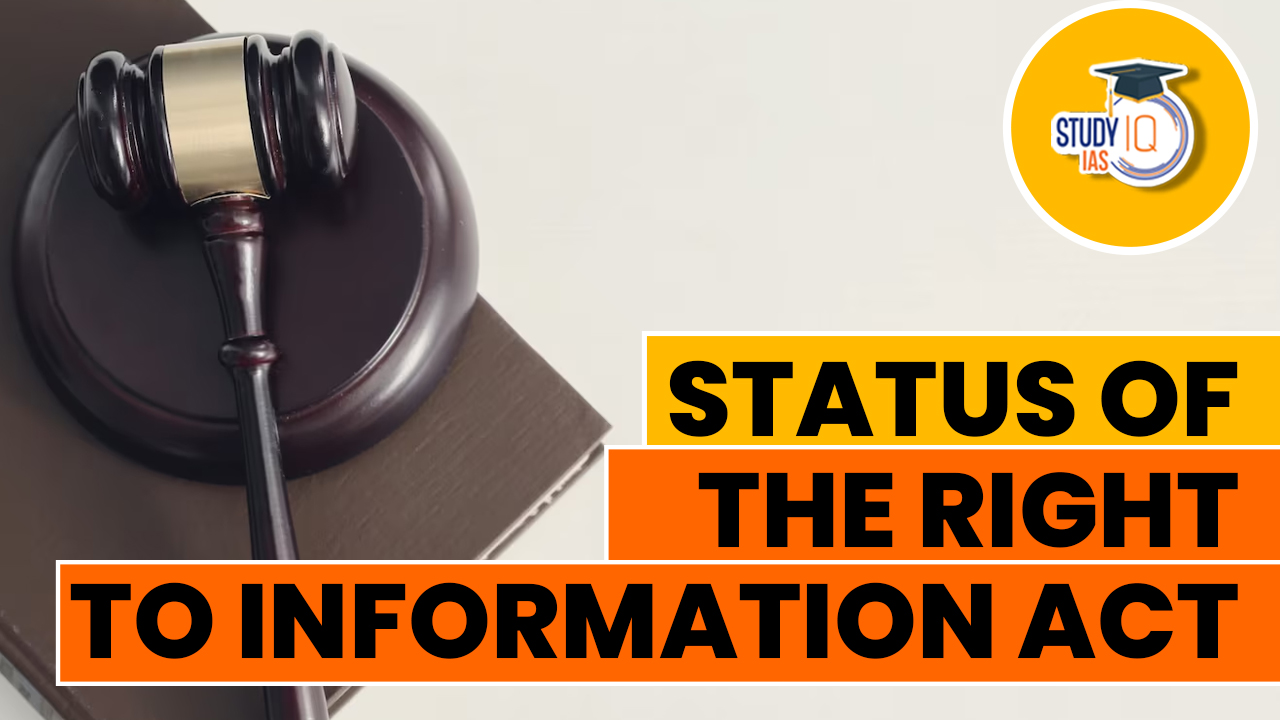Table of Contents
Context: According to some activists, the Right to Information Act, 2005, that aided citizens in accessing non-public information is becoming less effective.
About the Right to Information
- The Right to Information (RTI) is a legal framework that grants citizens the right to access information held by government and public authorities.
- It allows individuals to request and receive information about government activities, decisions, and policies, promoting transparency and accountability in government functioning.
- Right to Information is considered as 5th pillar of democracy.
- Freedom of information is a fundamental human right and the touchstone for all freedoms to which UN is consecrated – UNGA resolution 1946.
- In the case of State of U.P. v. Raj Narain (1975), the supreme court recognized the right to information as an integral part of the fundamental right to freedom of speech and expression guaranteed under Article 19(1)(a) of the Constitution of India.
Need for Right to Information
- Citizen Engagement: RTI enables informed citizen participation in government planning and decision-making, reducing project costs while enhancing outcomes.
- Transparency: It ensures transparency in government actions, curbing misuse of public funds and holding officials accountable.
- Limiting Discretion: RTI prevents abuse of discretionary powers, promoting fairness in government operations.
- Accountability: It empowers citizens to hold authorities accountable, reducing the burden on elected representatives.
- Media Effectiveness: RTI strengthens media’s role in informing the public and promoting government accountability.
About the Right to Information (RTI) Act of 2005
| About the Act |
|
| Salient features of the RTA Act, 2005 |
|
The RTI (Amendment) Act, 2019

Impact of the Digital Personal Data Protection Act, 2023 on the RTI Act, 2005
- Exemption of Personal Information: The new data protection law changes a provision in the RTI Act to exempt “personal information” from being disclosed.
- The RTI Act prohibits the personal data disclosure of citizens by the government, unless there is an overriding public interest in doing so.
- Now, the new law introduces a blanket ban on personal information, making it difficult to access information even if it relates to public activities or larger public interest.
- Impact on Transparency: Activists and experts are concerned that this change will reduce transparency and hinder the ability to access information.
- Critics argued that it would make ‘social audits’ in ration distribution impossible to carry out.
- In social audits, a community member gets a list of ration beneficiaries through an RTI request, and individually verifies that the beneficiaries got what they appear to have received on paper.
- Evasion of Accountability: There are also concerns that powerful public officials would evade accountability by invoking this blanket ban on disclosing personal information.
- Increased Denials: Officials are expected to deny more RTI requests using the personal information exemption, affecting the availability of crucial information.
Other Concerns with the RTI Act, 2005
- Implementation Issues: The RTI Act’s effectiveness depends on the implementation of subordinate rules by both Union and State Governments. Variations in the interpretation and implementation of these rules have created inconsistencies and challenges in accessing information.
- Unilateral Power to the Union Government: The Right to Information (Amendment) Act, 2019, gave the Union Government unilateral power in deciding the tenure and salaries of information commissioners. This has raised concerns about potential political interference and compromised independence.
- Poor Quality of Information: Due to lack of infrastructure and adequate processes to comply with the RTI Act, the quality of information provided is very low. The information provided is either incomplete or lacks the substantial data.
- Low Public Awareness: There is a lack of awareness among the general public about their rights and duties under the RTI Act.
- Payment Methods: The choice of payment methods for filing RTI applications is left to the States, resulting in disparities in accessibility.
- Some states do not accept common and convenient payment methods like Indian Postal Orders (IPOs), making the process burdensome for citizens.
- Staffing Issues: Information commissions, such as the Central Information Commission (CIC) and State Information Commissions (SICs), have faced delays and staffing issues, leading to prolonged waiting times for appeal hearings.
- Online RTI Accessibility: While online RTI filing can simplify the process, not all states have online RTI portals, and not all government bodies are registered on them.
- Issue of Enforceability: The Act does not give adequate authority to the Information Commissions to enforce their decisions.
- Information commissions can give directions to public authorities to take the steps necessary to comply with the Act, but are not empowered to take any action if such directions are ignored.
- Secrecy: The free flow of information in India remains severely restricted by the legislative framework including several pieces of restrictive legislation, such as the Official Secrets Act, 1923.


 Kailash Mansarovar Yatra to Resume Soon,...
Kailash Mansarovar Yatra to Resume Soon,...
 What is Tensor Processing Unit (TPU)?
What is Tensor Processing Unit (TPU)?
 SSC CGL Syllabus 2025 for Tier 1 and Tie...
SSC CGL Syllabus 2025 for Tier 1 and Tie...





















